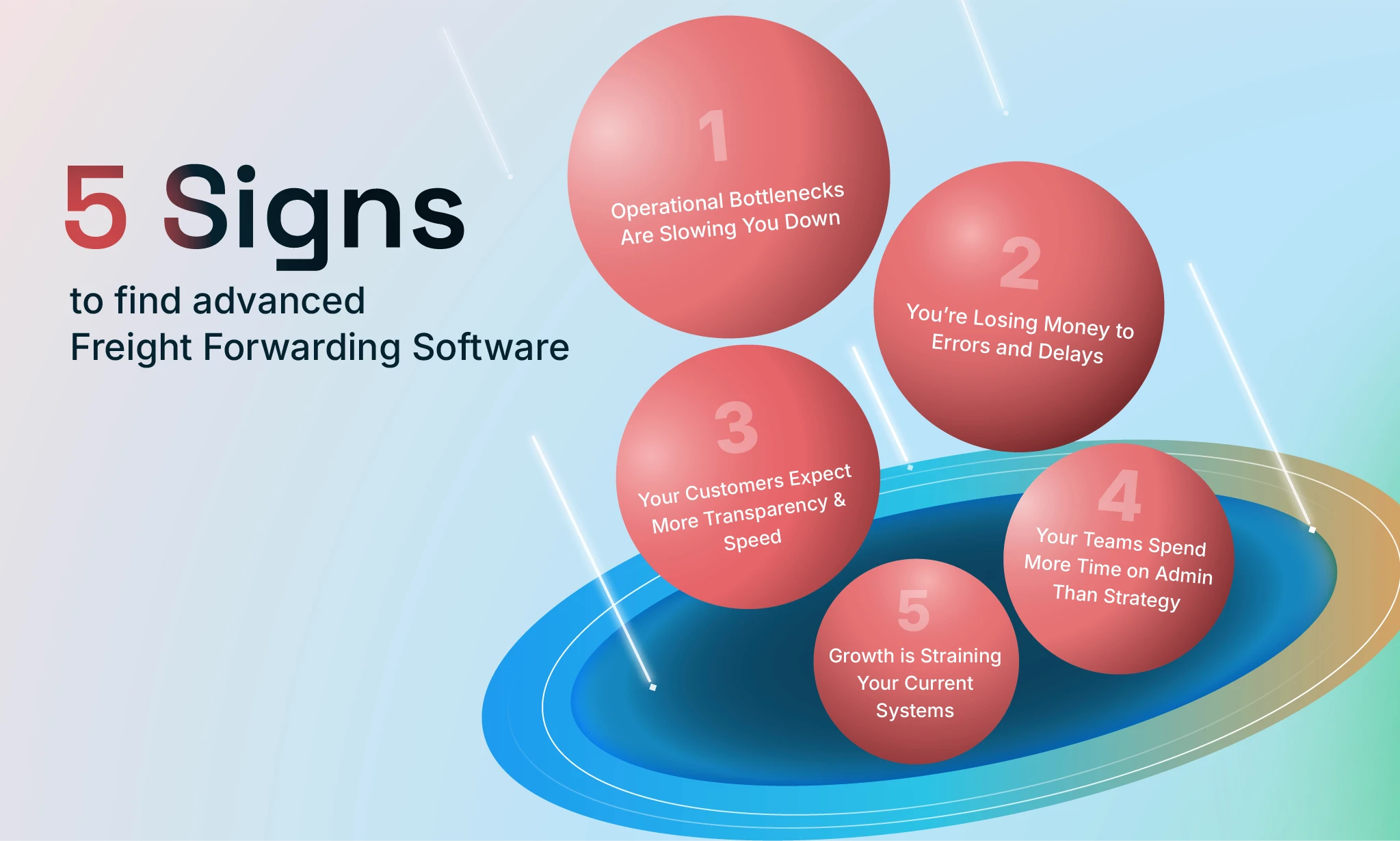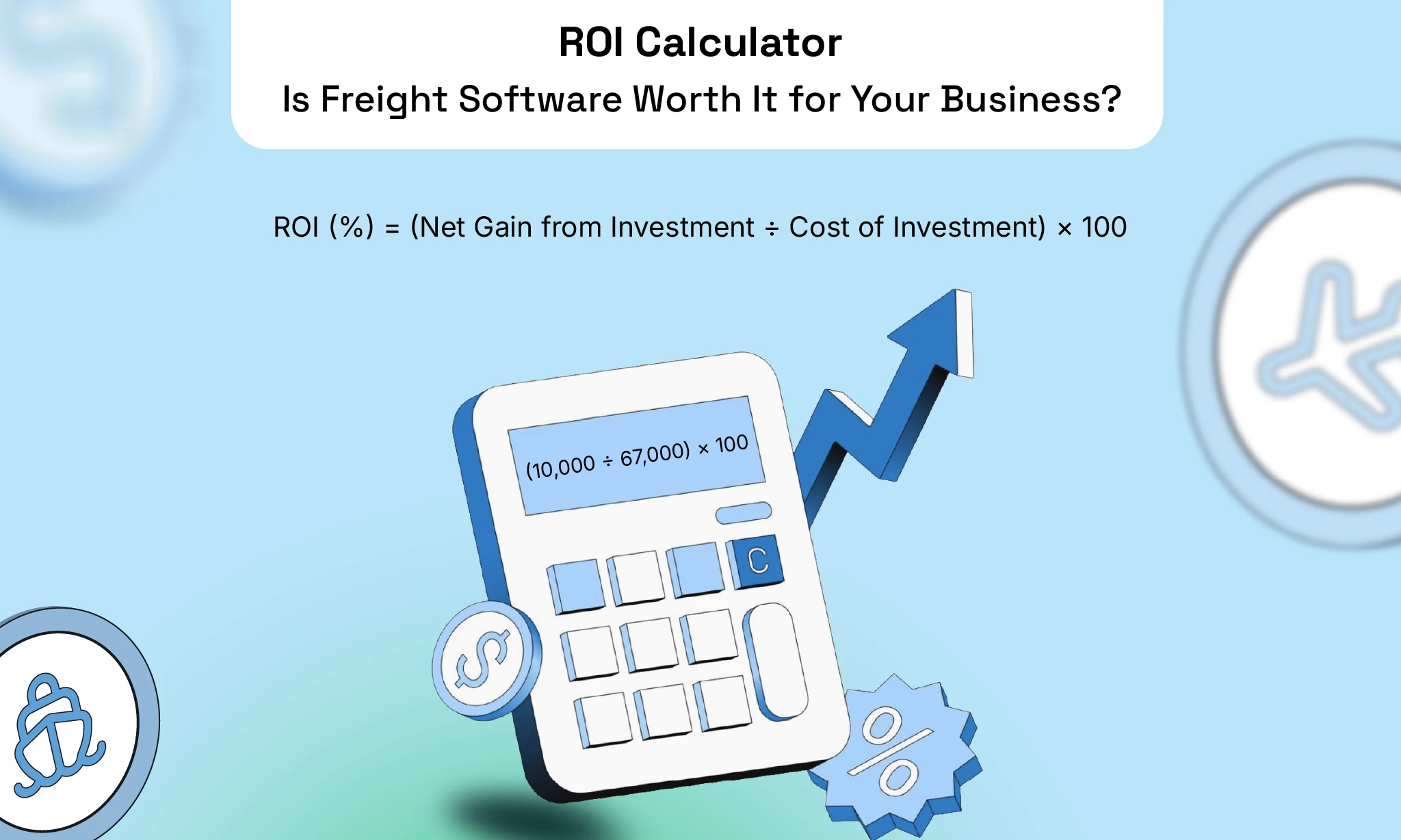10 Key Freight Management System Benefits in 2025
Author:
Dharshini Balamurugan
Published On:
Apr 24, 2025
1 min read
A freight management system (FMS) is the crux of handling your operations in the world of logistics. With efficiency, visibility, and adaptability becoming non-negotiable, one needs a robust system at hand. As we step further into 2025, logistics professionals, from freight forwarders to third-party logistics providers, and any logistics business are increasingly relying on smart software solutions to remain competitive. Among these, a Freight Management System (FMS) serves as the best companion for your business helping you streamline your operations, reduce costs, and future-proof your supply chain.
A freight management system (FMS) is the crux of handling your operations in the world of logistics. With efficiency, visibility, and adaptability becoming non-negotiable, one needs a robust system at hand. As we step further into 2025, logistics professionals, from freight forwarders to third-party logistics providers, and any logistics business are increasingly relying on smart software solutions to remain competitive. Among these, a Freight Management System (FMS) serves as the best companion for your business helping you streamline your operations, reduce costs, and future-proof your supply chain.
What is a Freight Management System?

A Freight Management System (FMS) or freight management software is essentially a platform that helps logistics companies manage their freight lifecycle from start to finish. From creating contacts to procuring rates to booking and tracking shipments, the platform has in-built features to help businesses deal with them in an organized and timely manner.
An FMS typically integrates with other systems like Transportation Management Systems (TMS), Warehouse Management Systems (WMS), Enterprise Resource Planning (ERP), and even third-party APIs (for customs clearance, carrier schedules, and more). In short, it acts as the command center of modern freight logistics. Freight brokers play a crucial role in coordinating the movement of goods between shippers and carriers, ensuring efficient logistics operations.
Key Freight Management System Benefits in 2025
A Freight Management System (FMS) is a crucial tool for businesses looking to optimize their logistics operations. It helps in managing the entire freight process, from order creation to final delivery, ensuring that goods are transported efficiently and cost-effectively. By automating various tasks, an FMS reduces manual errors, saves time, and enhances overall productivity.
An FMS leverages data analytics to improve freight management activities, streamlining processes and providing actionable insights that facilitate continuous improvement in logistics operations.
1. Boosted Operational Efficiency
Time is money, especially in logistics. A modern FMS helps in streamlining many of the time-consuming manual tasks, such as carrier selection, quote comparison, shipment booking, and document generation.
A freight management software reduces paperwork and eliminates redundant tasks, allowing teams to focus on the more strategic operations rather than linger on day-to-day admin. Additionally, real-time dashboards mean your team always knows the status of every shipment, helping avoid costly delays.
The logistics process in freight management is complex and involves multiple parties. Instead of spending hours juggling spreadsheets or calling carriers for quotes, your team can compare rates, book shipments, and generate shipping documents in just a few clicks.
2. Real-Time Shipment Visibility
One of the most valuable aspects of any freight management system is real-time tracking. In 2025, customers expect to know exactly where their shipments are at any given moment, much like tracking a food delivery.
With GPS systems, GPS-based tracking, and automated status updates, a freight management system allows you and your clients to monitor shipments from pickup to final delivery. This kind of transparency builds trust, improves communication, and empowers proactive problem-solving.
Real-time tracking improves customer satisfaction by providing accurate updates on shipment status. With real-time visibility, customers hold confidence and any delays or issues when raised can be dealt with swiftly.
3. Reduced Freight Costs
Managing costs is a constant battle in logistics, especially with rising fuel prices and labor shortages. A key part in the need for a FMS is its ability to identify the most cost-effective routes, carriers, and load combinations, which, ultimately help companies save a significant amount of time and money. By optimizing these factors, companies can significantly reduce their shipping expenses. Route optimization techniques help identify the most effective delivery routes while minimizing costs and environmental impact.
Spot rate comparisons, automated tendering, and consolidated shipments are just a few ways an FMS can lower freight spend. It also helps minimize penalties from detention, demurrage, and delivery failures.
4. Smarter Decisions Through Data & Analytics
Decisions based on guesswork are a thing of the past. Freight Management Systems provide detailed analytics dashboards and customizable reports to help you track KPIs like:
Delivery performance
Freight cost per mile
Carrier reliability
Average delivery time
Understanding the key components of an FMS is crucial for better decision-making and operational success.
These insights enable continuous improvement and allow for better demand forecasting, route optimization, and budget planning. Analytics turn freight operations from reactive to proactive.
5. Hassle-Free Compliance & Documentation
When goods are being shipped internationally, complex compliance is one of the biggest hurdles posed towards the smooth completion of the operation. With customs paperwork, Bills of Lading, commercial invoices and more to be handled in the right manner, maintaining compliance becomes crucial. An FMS system that can streamline documentation proves invaluable.
By storing the necessary paperwork for each shipment, it also helps ensure you are meeting the country-specific regulations, reducing the risk of hefty fines or shipment holds at the border.
6. Better Customer Service Experience
In any industry, customer service plays a vital role in determining the success of your organization. But in the logistics industry, service is everything. And a good freight management software can enhance your customer experience by
Providing real-time shipment status updates to meet rising customer expectations
Offering online portals for self-service tracking
Sending automated delivery confirmations
When customers are informed and can access their shipment data anytime, your service team spends less time answering basic queries and more time solving complex issues. FMS enhances customer satisfaction by improving delivery reliability.
7. Scalable and Flexible Operations
A robust freight management system can be called so when you can handle 100 shipments or 10,000. For a logistics company, the ability to scale with you is crucial. The right FMS will help you expand into new markets, onboard new clients, or manage seasonal peaks without overhauling your operations.
Modern FMS platforms are cloud-based, allowing your team to access and manage shipments across the supply chain from anywhere—be it your office, warehouse, or home. Growth becomes manageable when your systems scale with your business.
8. Seamless Integrations with Other Tools
The modern supply chain is interconnected. Your FMS should be too.
From ERP systems like SAP and Oracle to WMS platforms and accounting tools, your freight management software should integrate with your broader tech stack, making your supply chain operations seamless. This makes sure that the data flow is uninterrupted with fewer errors and less manual data entry.
Document management is also crucial in integrating with other systems, ensuring that essential paperwork is prepared, stored, and retrieved efficiently for compliance and error reduction.
You can even connect with external platforms like customs clearance systems, carrier APIs, and payment gateways for a truly end-to-end experience.
9. Support for Sustainability Goals
Sustainability is no longer optional, it’s a competitive advantage. Freight Management Systems help freight logistics operations companies become more eco-friendly by:
Optimizing routes to reduce fuel usage and fuel costs
Enabling carbon emissions tracking
Supporting digital documents over paper
By making environmentally conscious shipping decisions, you not only reduce costs but also meet the growing expectations of eco-aware customers and partners. Green logistics isn’t just good for the planet; it’s good for business.
10. Reduced Risks and Improved Security
From cargo theft to data breaches, logistics operations is filled with risks at every turn. A Freight Management System helps mitigate these by:
Ensuring better chain-of-custody documentation
Tracking assets in real-time to avoid shipment delays
Restricting access to sensitive data through user roles and permissions
Modern freight management platforms also come with built-in security protocols and backups, that helps in protecting your business from cyber threats or data loss, leaving both your operations team and your clients at peace.
How to Choose the Right FMS

Selecting the right Freight Management System (FMS) is critical to operational efficiency, visibility, and long-term scalability. Careful planning is essential to ensure the successful implementation and operation of an FMS in logistics.
1. Cloud-Based and Mobile-Responsive
A cloud-based FMS provides centralized data access across teams and locations, allowing for real-time updates and system availability in the supply chain without any infrastructure dependencies. With mobile responsiveness that enables on-the-go access, supporting agile decision-making and 24/7 control.
2. Intuitive User Interface (UI)
A clean and well-structured interface reduces the learning curve and accelerates user adoption. As a platform that is being used by multiple people to manage your operations, look for platforms that prioritize usability and offer role-specific dashboards and guided workflows to streamline daily supply chain operations.
3. Real-Time Shipment Tracking
An advanced FMS must offer end-to-end visibility across all shipment milestones. Real-time tracking improves operational transparency, allows early exception management, and supports proactive customer communication.
4. Integration Capabilities
The FMS you choose should be built in a way where it can integrate seamlessly with your existing systems—ERP, WMS, CRM, accounting software, and carrier APIs. Strong integration support reduces data silos, eliminates manual entry, and ensures operational continuity.
5. Customizable Reporting and Analytics
Effective decision-making relies on actionable data. Be sure to choose a system that enables customized reporting—by shipment, lane, client, or performance metrics, so you can monitor KPIs, identify trends, and optimize workflows accordingly.
6. Scalability and Flexibility
As your operations expand, your FMS should scale accordingly. Whether it’s adding new branches, user profiles, workflows, or service offerings, the system must be flexible enough to accommodate business growth without disruptions.
7. Responsive Customer Support
Reliable vendor support is essential, especially during implementation and critical operational events. Ensure the provider offers dedicated support channels, fast turnaround times, and comprehensive onboarding and training resources.
Selecting the right FMS is not just a technology decision, it’s a strategic investment for your freight operations. The solution that is adopted must offer long-term value, adaptability, and measurable improvements in efficiency and customer satisfaction in the logistics industry.
Conclusion
The road to efficient freight operations isn’t paved with spreadsheets.
With the right Freight Management System, you get speed, clarity, and control, all under one digital roof.
In a world where effectiveness, transparency, and cost-efficiency drive logistics success, having the right tools in place is no longer optional; it’s essential. The significant advantages of a Freight Management System include enhanced visibility and real-time tracking capabilities, allowing businesses to monitor shipments effectively, manage logistics operations with increased transparency, and respond more adeptly to any potential disruptions.
A Freight Management System empowers logistics companies to optimize every aspect of their operations from shipment booking to delivery and stay ahead of the curve.
Ready to Transform Your Freight Operations?
CargoEZ offers a powerful, intuitive Freight Management platform designed specifically for modern freight forwarders and logistics operations providers. Our platform provides tailored solutions to enhance your logistics and freight management operations, ensuring you can adapt to market demands. Book a free demo today and see how we can help streamline your workflows and scale your business.
Frequently Asked Questions (FAQs)
1. What is a Freight Management System (FMS)?
An FMS is a software solution that helps manage the entire freight process, right from rate procurement and booking to tracking and documentation—all in one place.
2. Who should use a Freight Management Software?
Freight forwarders, 3PLs, logistics providers, and freight brokers of all sizes can benefit, especially those looking to streamline operations, reduce costs, and scale efficiently. Freight brokers, in particular, can use the software to negotiate shipping rates, connect with suitable carriers, and manage the logistical details involved in transportation.
3. How long does it take to implement a Freight Management System?
Implementation time depends on the complexity of your operations and the number of integrations required. On average, companies can expect a fully functional system within 2–6 weeks, including training and data migration.
4. Can an FMS integrate with my existing systems?
Yes, most modern FMS platforms offer seamless integrations with ERPs, TMS, WMS, CRMs, and carrier APIs to ensure smooth data flow and operational excellence.
5. Is a cloud-based FMS better than on-premise solutions?
Absolutely. Cloud-based FMSs offer remote access, real-time updates, automatic backups, actionable insights, and better scalability—all without heavy IT infrastructure.
6. Does an FMS support international shipping documentation?
Yes, a good FMS streamlines the creation and storage of necessary documents like commercial invoices, Bills of Lading, and customs forms across your supply chain.
Don't forget to share this blog!



